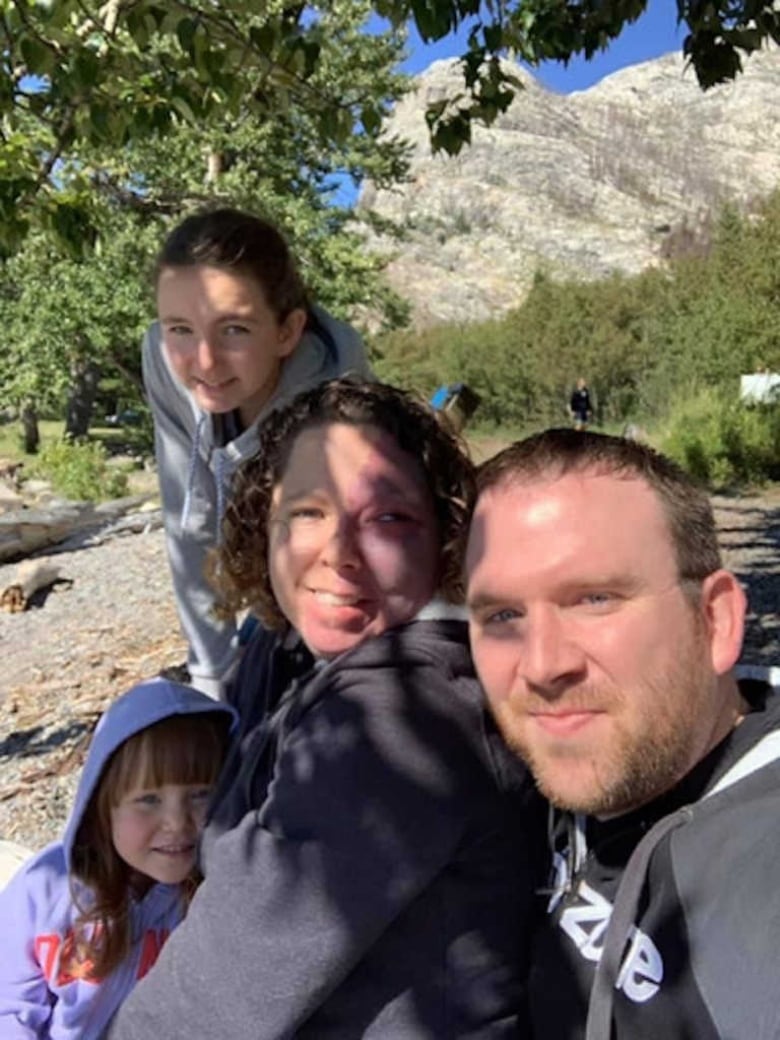A kiss from my daughters takes away my fears about my purple skin
My kids are my fiercest allies in a world that looks down on my difference

This First Person column is the experience of Chelsey Peat who has Sturge Weber Syndrome. For more information about CBC's First Person stories, please see the FAQ.
I can still remember that particular busy autumn evening as I ran in with my eldest daughter, Athena, hoping to get to her classroom on time for parent-teacher night. We walked into the room and it seemed like everyone was staring at me. A few adults quickly hushed their kids' whispers. A classmate yelled at my daughter, "What's wrong with your mom's face?"
I was shocked and started to explain my condition when my then six-year-old daughter looked back at him, rather annoyedly and said, "It's my mom's birthmark! Don't be rude!"
Many of the kids whispered "oh" and "cool." She went back to playing with her friends. To say that I was proud of how she handled that situation is an understatement.
I was quite young when I realized I looked different from everyone else because of my large facial birthmark. I always thought I would be alone because of how I was judged so quickly based on my looks. Being compared to Batman's supervillain Two-Face made it hard to believe I could ever find love. I was lucky enough to meet my husband, who saw me for who I am rather than how I look, and we fell in love.
When I found out I was pregnant for the first time, I was overjoyed but then I began to worry on how the world would judge my children. For many of us with Sturge Weber Syndrome, pregnancy is not even an option. I also worried I might pass on my condition to my children.
I saw how people judged me, and judged my husband for being with me and I didn't want my children to grow up with that social stigma. Both of my pregnancies and births were just like everyone else's and when I held those little hands, and walked them to school I felt like a regular mom.

When my girls were old enough to notice my birthmark and ask about it, I explained how my special purple skin was rare. From a young age, we talked about acceptance and never judging others on how they look. With Athena, especially now that she's a teenager interested in makeup, I've shared with her why I don't wear it as I don't feel I need to hide behind a mask of cosmetics. When my girls kiss my purple-skinned cheek, I feel "normal" around them and their unconditional love.

Unfortunately some of my fears did come to light, and I've seen how my facial difference has impacted my children. My daughters suddenly get disinvited from birthday parties or sleepovers, or I learn certain kids are no longer friends with mine after the parents saw me dropping off my kid. That's the stuff you can't know for sure but suspect, but then there are more obvious reactions when adults stare at me and unconsciously move away as though I'm infectious.
With time, both my daughters have become my advocates. My five-year-old Zelda will happily talk about Mommy and her special purple skin. Thanks to them, I've begun to feel more self-confident as I strive to be a role model. Athena and Zelda are always there to cheer me on with my advocacy and other work in the facial differences community. I know they are kinder and more resilient because they've seen the discrimination I face.
Growing up, my mom was always there to support me — to be the shoulder to cry on when the bullies had their fun. When I found out I would be the mother of two daughters, I realized fate brought me my strongest allies. Their view on the world is similar to mine: we see the world a little differently and with a kinder, more accepting heart. As the saying goes, your daughters will grow up to be your best friends. I know that will be the case for me!
Do you have a compelling personal story that can bring understanding or help others? We want to hear from you. Here's more info on how to pitch to us.

